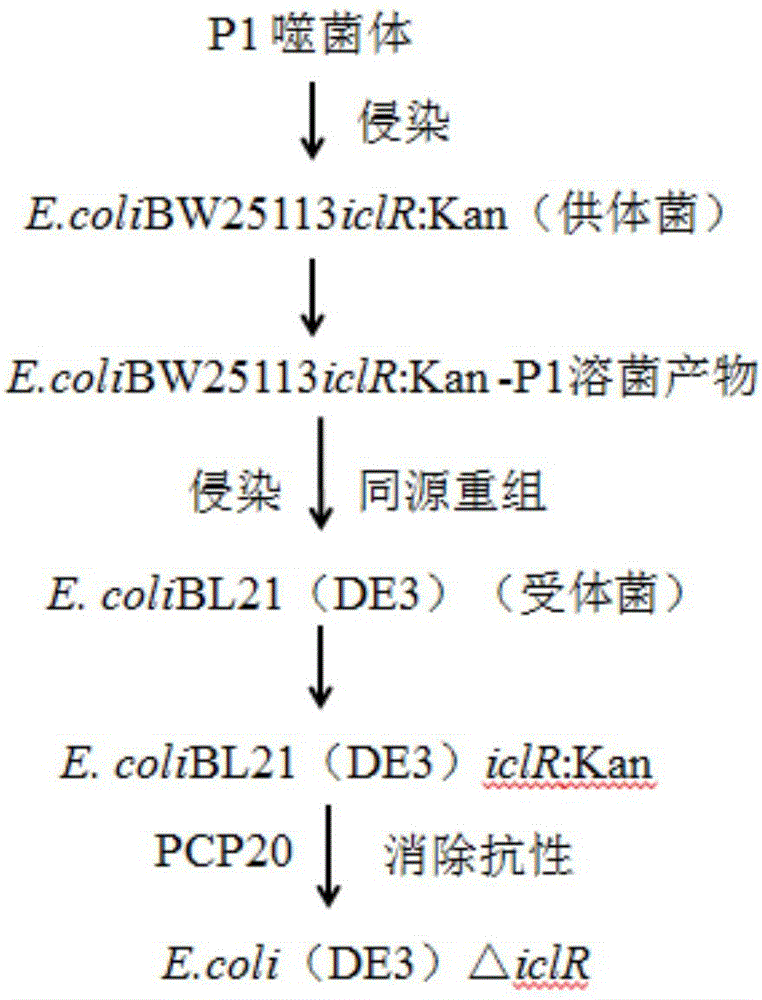Construction method and application of high-yield phloroglucinol gene engineering bacterium
A technology of genetically engineered bacteria and phloroglucinol is applied in the field of genetic engineering to achieve the effects of increasing yield, high industrial application value, and improving circulation activity
- Summary
- Abstract
- Description
- Claims
- Application Information
AI Technical Summary
Problems solved by technology
Method used
Image
Examples
Embodiment 1
[0058] Example 1 Construction of mutant strain E.coli(DE3)△iclR
[0059] In this example, Escherichia coli E.coliBL21(DE3) was used as the starting strain, and the iclR gene was knocked out by using the P1 phage transduction technology to construct the mutant strain ZG-2280( figure 1 ).
[0060] Those skilled in the art should understand that each step of the gene knockout experiment of Escherichia coli E.coliBL21(DE3) was carried out according to standard molecular cloning techniques.
[0061] 1 Preparation of donor bacteria lysate
[0062] 1) Cultivate the recipient strain E.coliBW25113iclR:Kan overnight;
[0063] 2) Add 4ml of heated and melted 0.4% agar medium to a sterile 10ml EP tube, add 400μL of overnight culture recipient bacteria, add 10μL of P1 phage stock solution, mix well, pour into non-antibiotic plate, and cultivate in a humid environment.
[0064] 3) After the appearance of irregular plaques, collect the proliferating phage lysate and add about 400 μL of chlo...
Embodiment 2
[0073] Example 2 Preparation of recombinant plasmid
[0074] For the construction process of the original plasmids pET-phlD-marA and pACYC-accADBC, please refer to the literature: Yujin Cao, Xinglin Jiang, Rubing Zhang, Mo Xian. Improved phloroglucinol production by metabolically engineered Escherichia coli[J].Appl Microbiol Biotechnol,2011,91:1545 –1552. In this example, on the basis of the original plasmid pET-phlD-marA, the acs gene was inserted, and the overexpression of acs was induced by the T7 promoter to obtain the recombinant plasmid pET-phlD-marA-acs.
[0075] 2.1 Preparation of recombinant plasmid pET-phlD-marA-acs
[0076] Using the Escherichia coli E.coli (DE3) genome as a template, design primers to amplify the acs gene. The primer sequences are as follows:
[0077] acs-5':5'-CTAGCCATGGCTAGCCAAATTCACAAACACACC-3'
[0078] acs-3':5'-CGGGATCCTTACGATGGCATCGCGATAGC-3'
[0079] The gene acs and the vector pET-phlD-marA were double-digested with NcoI and BamHI respec...
Embodiment 3
[0082] Example 3 Production of Phloroglucinol by Fermentation
[0083] 3.1 Shake flask fermentation experiment
[0084] 1) For the cultivation of primary seed liquid, inoculate the control strain ZG-1944 and the engineering strain ZG-2294 into 3 mL LB liquid medium respectively, add 50 μg / mL kanamycin and 50 μg / mL chloramphenicol, and incubate at 37°C Grow for 8-12h.
[0085] 2) Transfer the primary seed solution to a 250mL fermentation shaker flask with 1% inoculation amount, containing 50mL fermentation medium, and add 200g / L MgSO4.7H2O 100μL, 500g / L glucose 2mL, 1000× 50 μL of trace elements, 50 μg / mL kanamycin, 50 μg / mL chloramphenicol double resistance, set 3 parallel controls for each strain, and culture at 37°C and 180rpm.
[0086] 3) Cell OD 600 When it reaches 0.6-0.8, 100μM / L IPTG can be added for induction.
[0087] 4) After induction by IPTG, continue to culture at 37°C and 180rpm for 24 hours, then collect the bacterial liquid, centrifuge to get the supernatan...
PUM
 Login to View More
Login to View More Abstract
Description
Claims
Application Information
 Login to View More
Login to View More - R&D
- Intellectual Property
- Life Sciences
- Materials
- Tech Scout
- Unparalleled Data Quality
- Higher Quality Content
- 60% Fewer Hallucinations
Browse by: Latest US Patents, China's latest patents, Technical Efficacy Thesaurus, Application Domain, Technology Topic, Popular Technical Reports.
© 2025 PatSnap. All rights reserved.Legal|Privacy policy|Modern Slavery Act Transparency Statement|Sitemap|About US| Contact US: help@patsnap.com

